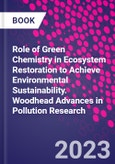Role of Green Chemistry in Ecosystem Restoration to Achieve Environmental Sustainability deals with current challenges of environmental problems along with the approaches of environmental sustainability in alliance with green chemistry. The book shows how to lessen the impact on the environment by maintaining a balance between society, the environment, and the economy, all of which are regarded as fundamental pillars of sustainability. Furthermore, policymakers and scholars will gain insights into how to develop and explore innovative techniques for achieving sustainable development goals. This book is unique in the field of environmental sustainability, as it is based on green chemistry concepts.
Please Note: This is an On Demand product, delivery may take up to 11 working days after payment has been received.
Table of Contents
(A) Environmental management
1. Recent advances in sustainability science for environmental conservation
2. Role and application of green chemistry and nanotechnology in environmental sustainability
3. Ecosystem restoration in urban/peri-urban areas through urban sustainability
4. Role of environmental sustainability for climate change adaptations
5. Importance of indigenous knowledge in achieving environmental sustainability
6. Recent environmental management practices adopted in developed countries
7. Role of artificial intelligence to achieve environmental sustainability
(B) Water sustainability
8. Sustainable approaches of heavy metal removal from water
9. Chemistry of water quality parameters for aquatic lives
10. Application of pyrolysis techniques to produce bio-sorbents for water treatment
11. Application of environmental chemistry in the detection of emerging environmental problems and their impacts
12. Socio-economic factors for environmental management in the pharmaceutical industries
13. Emerging organic water pollutants (pesticides, dyes etc) and their remediation strategies
(C) Waste management and environment protection
14. Waste valorisations by environment friendly approaches such as biorefinery
15. Resource recovery from the e-wastes through bioleaching
(D) Agricultural sustainability
16. Role of soil chemistry for agricultural sustainability
17. Role of microbes and plants in soil heath maintenance
18. Green approaches for the development of bio-pesticides and bio-fertilizers








